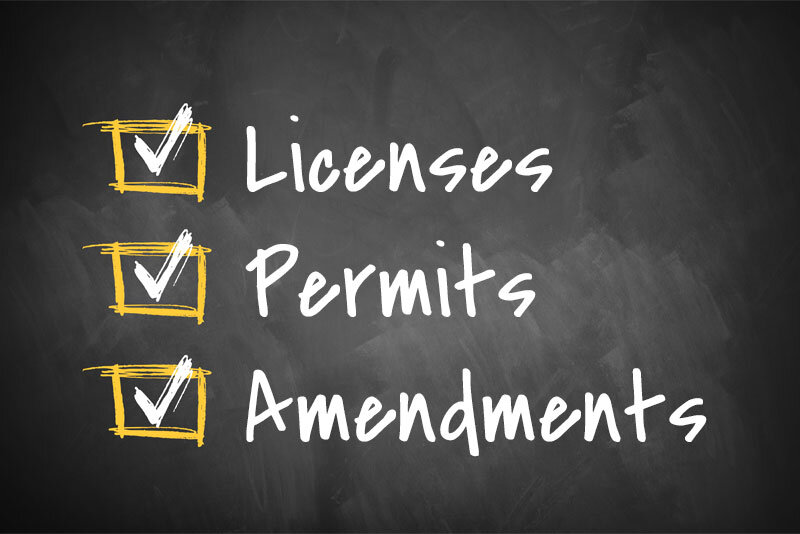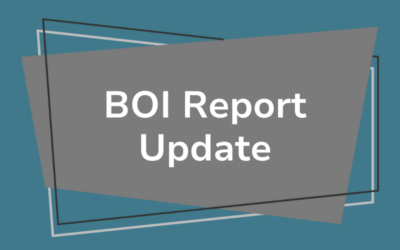Tax season is over (for most of us). So, what’s next for business owners and professional advisors with business clients? With so much disruption and distraction this year, you may have fallen behind keeping up with compliance for business licenses, permits, and identification numbers. Here’s a mid-year business checklist to get you back on track.
Federal Tax ID
Getting a Federal Tax ID number (or an Employer Identification Number—EIN) is optional if you’re a Sole Proprietorship, but if your business acts as a C Corporation, Limited Liability Company, or a Partnership, you and your business clients are required by law to have one. Without a Federal Tax ID number or EIN, you can’t get a business bank account or file your business tax returns. You can apply for an EIN online on the IRS website, or CorpNet can obtain one for you.
Federal Licenses and Permits
If a business is regulated by a federal agency, you most likely need a federal license or permit. Businesses selling, manufacturing, importing, or wholesaling alcohol, for example, are regulated by the Alcohol and Tobacco Tax and Trade Bureau. Then, depending on what your business actually does, the requirements and application processing times vary.
State and Local Licenses and Permits
Most of the required licenses and permits for businesses will come from your city, county, and state business development offices. Start with a business license in the city where the business is located. You’ll need to provide data on your business, make sure you’re in zoning compliance, and pay an annual fee. Your local government makes sure your business is operating safely and according to specific regulations and procedures determined by location and industry. In the example of selling alcohol, many states have an Alcohol Beverage Control (ABC) office which regulates on-premise and off-premise sales of alcohol. Likewise, although restaurants are regulated by the Food and Drug Administration (FDA), restaurant owners must also adhere to local regulations such as acquiring a sidewalk café permit. Other licenses and permits may also be required, such as permits for security alarms, parking lots, entertainment, environmental and more.
Specialty Licenses and Permits
There is also a myriad of licenses and permits for professional and niche businesses. Acquiring a specialty license means the business has the specific skills to operate a company in certain fields. For example, hair and nail salons, accountants, legal, plumbers, electricians, collection agencies, daycare, pesticide dealers, and more.
Sales Tax License and Reseller Permit
A business selling products and services subject to sales taxes will need a sales tax license from the state tax authority office. Selling in more than one state? You’ll need a license in each state. Sell taxable products on a wholesale basis to retailers? You’ll need a reseller license (resale certificate)which gives a business permission to sell taxable products without collecting sales tax. Having to collect sales tax usually occurs when a business has a physical presence (or a nexus) in a state. However, there are circumstances (e.g. online businesses) where state laws consider the business to have nexus without a physical presence. This doesn’t have to be overwhelming. CorpNet can register for sales and use tax for you.
Payroll Compliance for Employers
Once you’ve acquired an EIN, you must register with your state’s labor department before you bring on employees. You’re required to pay state unemployment compensation taxes. Depending on your business type, you may also be required to get workers’ compensation insurance. The IRS also requires each employee to fill out IRS Form W-4 (Withholding Allowance Certificate), so you can determine the right amount of taxes to withhold and Form I-9 (Employment Eligibility Verification) to verify each employee is eligible to work in the U.S. If you are not in compliance with payroll taxes, CorpNet can help you register for payroll taxes and get you on the right track.
Moving a Business to a New State
If you or your clients are planning on moving your business to a new state, it’s important to cancel local business licenses and permits before applying for new ones in your new location. Also, be sure to withdraw the business name from the Secretary of State’s office and apply for a new one. The IRS needs a change of address for the EIN. Corporations and LLCs can either dissolve the corporation in the old state and reregister in the new state or file a foreign qualification in the second state. A foreign qualification allows a business to do business in a different state than the home state of the business. The process involves submitting a Certificate of Authority (or Statement and Designation) application form and paying fees to the Secretary of State office. Next, you need to hire a registered agent in the new state to handle official federal and state correspondence, tax notices, and corporate filing requirements. CorpNet can also act as a registered agent.
Amendments and Modifications
In most states, an amendment to the Articles of Incorporation or Articles of Organization is required if a business is making any changes to an existing corporation or LLC. An amendment is the official notification of changes within the company’s organization of your company. Relevant changes include:
- Changes to the Company Name
- Changes to the Registered Agent Information
- Change of Company Business Address
- Director or Member Information
- Number of Authorized Shares
- Business Activities of the Company
Closing a Business
If you or your client closed or are planning on closing a business this year, it’s important to legally close the business. Without properly closing the business, the government still expects compliance for filing annual reports, filing state/federal tax returns, and maintaining miscellaneous business licenses and filings for the closed business. To formally dissolve, the company needs to notify all the states in which the business is transacted. Corporations, LLCs, and partnerships must hold a meeting with all partners and board members and vote to close the business, and then document the vote in the meeting minutes. Then the business must file a form called Articles of Dissolution, Certificate of Termination, or Certificate of Dissolution with the Secretary of State’s office in the state where the LLC or Corporation was formed.
Converting a Business
Have you or your clients considered converting the legal structure of the business? If you need more asset protection or want to take your business public, switching entities is possible if you take the proper steps. Going from a sole proprietorship to a corporation or LLC means conducting a name search for the entity’s new name and filing the correct documents with your state, such as the Articles of Incorporation. To change from an LLC to a C Corporation, all members must vote for the change in structure and then file a document with the state called a statutory conversion. If the state doesn’t accept a statutory conversion, you can register a separate C Corporation and make the original LLC a subsidiary or a DBA. Learn more about conversions.
Reinstatements
If a Corporation or LLC fails to follow its corporate requirements, the company is at risk of not only losing its good standing with the state but it can be dissolved or placed in a non-compliant status by the Secretary of State. In order for the business to return to active compliant status with the secretary of state’s office, the company must file for a reinstatement. A reinstatement is a legal filing submitted with the Secretary of State’s office to officially bring the business back into good standing and in active compliant status with state requirements and deadlines.
We’re Here to Help!
As businesses and governments slowly get back to business, you may find it difficult to walk into a licensing office to acquire the proper licenses and permits. Start by visiting your Secretary of State and city business development websites. Most offices have pivoted to online applications. Or, let CorpNet help smooth the process for you and your clients.





